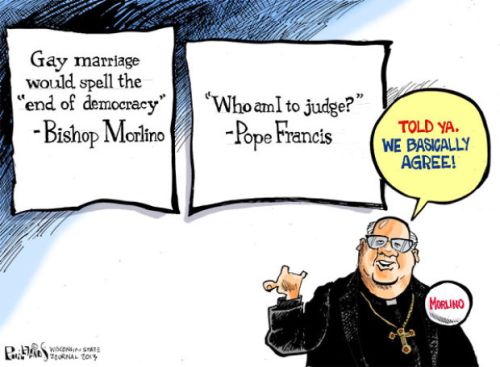Catholics are Both/And people, not Either/Or people.
by nonewsisnew

Image used without permission from http://host.madison.com/hands-cartoon-morlino-and-the-pope/image_83020bf8-fad8-11e2-80f0-0019bb2963f4.html
People living a life in opposition to Church teaching is not new. When the organized persecution of Christians started under Emperor Decius in the year 250, there were many who wanted to escape the suffering. These people offered sacrifices to the Roman pantheon of gods to avoid martyrdom. Some offered only incense, and some merely faked certificates of sacrifice. When Emperor Galerius halted the persecution in 311, roughly 60,000 Christians had died and many had become lapsi (lapsed) by the sacrifices they made to the Roman deities. When the persecution stopped, many of these lapsed Catholics wanted back into the Church.
Novatian, who was acting head of the Church after Pope Fabian was martyred and until the next election could take place, decided these people should not be re-admitted. Perhaps he might even be presumed to say “re-admittance would spell the end of the Church”. Others supported blindly accepting these people back in. After all, “Who am I to judge people for simply desiring to live”.
As divine providence would have it, Novatian wasn’t elected pope, and instead we received Pope Cornelius. He wisely chose the middle road, whereby people could be re-admitted to the Church only following an appropriate period of penance. Novatianism became an official heresy and it became clear that the Church would accept those who wanted to join her regardless of their pasts, as long as they were repentant of those pasts. The duality of both acceptance of the person and rejection of the sin was recognised as the Church’s practice.
This “Both/And” approach is seen working itself out in the above political cartoon, where indeed Pope Francis and Bishop Morlino indeed agree with each other. We can see this by looking at a fuller version of Pope Francis’ quote, which reads:
“If a person is gay and seeks God and has good will, who am I to judge them?”
That “seeks God and has good will” implies living out the teaching the Church has on homosexuality, which is that the action of same sex sex is contrary to authentic sexual love (see paragraphs 2357-2359). In this way the two quotes are in agreement: acting out on homosexual urges is against God’s will and is at it’s root bad for the person who acts on those urges; and consequently the actions should be avoided.
The reverse is also true. In the quote from the comic, Bishop Morlino is talking about acting on homosexual urges in the form of a recognized union, but in the very same homily this quote is taken from he also says, “I know that some of the people who want to pull out all the stops to protect authentic marriage are gay-bashers. I wish that they weren’t on my side. I don’t want to bash anybody. Every human being is one for whom Jesus Christ shed His blood and we should treat every human being that way. Period.” Clearly the Bishop agrees with Pope Francis that it’s not our place to bash or judge those who have same sex tendencies.
Both Pope Francis and Bishop Morlino avoid the error of Novatianism, Both accept that those who are trying to follow the will of God shouldn’t be thwarted by the Church. However, both also are clear that the will of God excludes same sex actions.
Those in the media tend to see things as Either/Or. Bishop Morlino is cast as some sort of Novatianist who is opposed to welcoming homosexuals in the Church. Pope Francis is cast as someone who would accept homosexuals without claiming the action of homosexual sex is sinful. The reality is that both men accept the person without accepting the action. They believe that both that the person should be loved and accepted as well as that any sinful actions should be deemed (dare I say judged?) as bad. In this way, both follow the path laid out by Pope Cornelius in dealing with the Lapsi, and both men are neither Novatians nor blind to sin.
Although, a cartoon about that fact that both men follow a path laid out around 1750 years ago wouldn’t really move papers, so I understand why a false “new” controversy needs to be in the news.